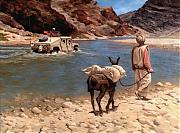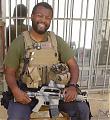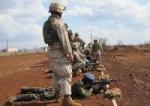Inside a brightly lit room, the walls adorned with memorials to 23 dead American soldiers, Lt. Col. Robert Balcavage stared at the three Sunni tribal leaders he wanted to recruit.
Their fighters had battled U.S. troops. Balcavage suspected they might have attacked some of his own men. The trio accused another sheik of having links to the Sunni insurgent group al-Qaeda in Iraq. That sheik, four days earlier, had promised the U.S. military to fight al-Qaeda in Iraq and protect a strategic road.
"Who do you trust? Who do you not trust?" said Balcavage, commander of the 1st Battalion, 501st Parachute Infantry Regiment of the 25th Infantry Division, his voice dipping out of earshot.
An hour later, he signed up some of America's newest allies.
U.S. commanders are offering large sums to enlist, at breakneck pace, their former enemies, handing them broad security powers in a risky effort to tame this fractious area south of Baghdad in Babil province and, literally, buy time for national reconciliation ...
Balcavage stared around the room. Fahad, Khadr and a third Jenabi leader, Falah Khadr Muhammad, sat on one side along with three other tribesmen. Farther down the table was a thick-bearded American civilian and former Special Forces soldier.
And next to Balcavage: Fadhil Youssef, a former Sunni insurgent who had spent six months in a U.S. military detention center. He was Balcavage's conduit into the arcane world of Iraq's tribes. Balcavage said he trusted him.
Speaking through an interpreter, the commander made his offer to the sheiks. Each of their men would receive about $350 a month. That pay would create an incentive to join the Iraqi police, whose salary is roughly $500, when it was possible, he said. The military would also pay the sheiks $100 for every bomb plucked off the roadside ...
They immediately accused Sheik Sabah of having links to al-Qaeda in Iraq and of playing a role in driving them off their lands.
"Sheik Sabah represents the leaders of al-Qaeda who did the killing," Fahad said.
Balcavage asked Fahad whether Sabah belonged to the Islamic Army, which is fighting al-Qaeda in Iraq, or to al-Qaeda in Iraq itself.
"Al-Qaeda," Fahad replied. Sabah, he alleged, claimed to have switched allegiances to the Islamic Army as a way to make himself more attractive to the Americans.
Perplexed, Balcavage looked at Youssef. It had been less than two weeks, but two rival factions already had arisen within the "concerned citizens." Sabah had formed a group called the VIP Council. Youssef's was called the Iraq Rescue Council.
...
Balcavage said he didn't know whether Youssef and other sheiks were trying to poison the military's relationship with Sabah. On July 23, Sabah signed an initial contract to provide 300 men and guard a key supply route to Fallujah and Baghdad.
"The only thing I know is my experience with Fadhil," said Balcavage, referring to Youssef. "I'm trusting my gut. I could be horribly wrong in this situation."
And what about Sabah? Was Balcavage worried about the al-Qaeda in Iraq allegations?
"I'm going to reel him in," Balcavage said. "To keep your enemy close type of thing. Feel him out. I'm going to see how many contacts, how much information I can find out from him. I'll bring his tribe in, if nothing else, and make sure all the agreements get signed."
On Thursday, a group of senior-ranking sheiks made contact with U.S. commanders to become "concerned citizens."
Sabah is their representative.














Bookmarks